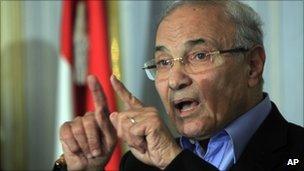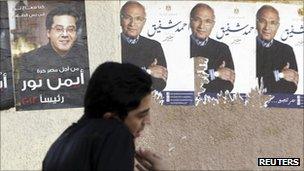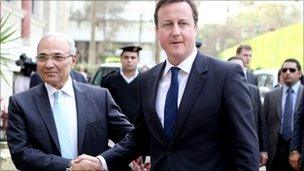Egypt candidate: Ahmad Shafiq, former prime minister (original) (raw)

Image caption,
Ahmed Shafiq, a former military man, was the last prime minister under Hosni Mubarak
Just a year after he was forced to resign as Egypt's prime minister because of his links to the government of the ousted President Hosni Mubarak, Ahmed Shafiq hopes to return to political life as the new president.
If he succeeds, he will become the latest in a succession of military men to rule since the 1952 Young Officers' Revolution.
A former fighter pilot, like Mr Mubarak himself, Ahmed Shafiq served as commander of the Egyptian air force from 1996 to 2002.
He then went on to become the country's first civil aviation minister, earning a reputation for administrative competence and efficiency.
His restructuring of the state-owned airline, EgyptAir, made it into a competitive business. He also renovated the nation's airports, giving a boost to the important tourism industry.
In media interviews, Mr Shafiq, 70, has portrayed himself as the only presidential contender who combines civilian experience with knowledge of the military, which is overseeing the democratic transition.
He argues he can ensure a successful handover of power.
"You cannot suddenly bring a civilian man with no relation or knowledge of military life and make him a president and supreme commander of the armed forces," he told the Reuters news agency earlier this year.
"Egypt needs a gradual shift."
He has promised he will change the way the army is treated by the state, making it pay taxes on profit it gets from its wide range of businesses.
With many Egyptians worried by the deterioration in security since last year's uprising, Mr Shafiq clearly hopes to attract voters who continue to see the military as the only institution that can prevent complete turmoil.
"I appeal to the ordinary and normal Egyptian family… and I do not belong to any party and choose to remain independent of any party," Reuters quoted him as saying.
He can also count on the support of influential businessmen who associate him with the neo-liberal economic policies of the late Mubarak years.
Mubarak's man
Posters of Ahmed Shafiq dressed in a shirt and his trademark blue pullover, have recently been put up around Cairo as part of his presidential campaign.

Image caption,
Posters of Ahmed Shafiq show him in his customary blue jumper
However for young revolutionaries his appearance brings back bad memories.
Mr Shafiq became known as "the man in the blue jumper" or "Mubarak's man" and was made the butt of jokes after he was selected to be prime minister on 29 January during the last days of the Mubarak presidency.
His relationship with the protesters in Tahrir Square worsened as he ignored their demands and offered to send them sweets. He suggested their campsite should simply be converted into a speaker's corner as found in London's Hyde Park.
As pressure mounted on the military, Mr Shafiq stayed in his post for just three weeks after the end of the revolution.
He resigned on 3 March, a day after appearing in a talk-show on ONTV. The prime minister was seen as condescending and evasive and was rattled by critical comments from the famous author and long-time opposition figure, Alaa al-Aswany.
Despite being a confident communicator, Mr Shafiq, has continued to have problems in media interviews.
In January this year, his staff confiscated tapes from a BBC Arabic interview after he was questioned about Mr Mubarak and the future of the head of the military council, Field Marshal Hussein Tantawi.
Battle-worn
Born in 1941 in Cairo, Ahmed Shafiq graduated from the Air Force Academy in 1961. He later completed a master's degree in military sciences and a PhD in military strategy.
He fought in three wars including the 1973 Arab-Israeli war in which he was a senior fighter pilot under Hosni Mubarak's command. He is said to have downed two Israeli airplanes.
After leaving the military and diplomatic service, it was widely believed that Mr Mubarak helped set his career path, even creating the post of civil aviation minister to suit his old comrade and friend.

Image caption,
Ahmed Shafiq was Egypt's prime minister during the revolution and its immediate aftermath
Mr Shafiq served in the post for over a decade before he was promoted to prime minister.
In the last few years when President Mubarak was in office there was some speculation that he could become his vice-president or successor.
However, he was overshadowed by Mr Mubarak's younger son, Gamal, who was increasingly viewed as the favoured candidate.
While his former boss and his sons now face corruption charges along with most other members of the Mubarak cabinet, so far Mr Shafiq has avoided a similar fate.
A number of lawsuits have been filed against him but he denies any wrongdoing.
New legislation passed by Egypt's parliament was a last-minute obstacle to Ahmed Shafiq's campaign. This was intended to ban top officials who served under Mr Mubarak in his last decade in power from becoming president.
After the law was ratified, the elections commission announced Mr Shafiq was barred from the race, only to reinstate him a day later, saying it had accepted his appeal.